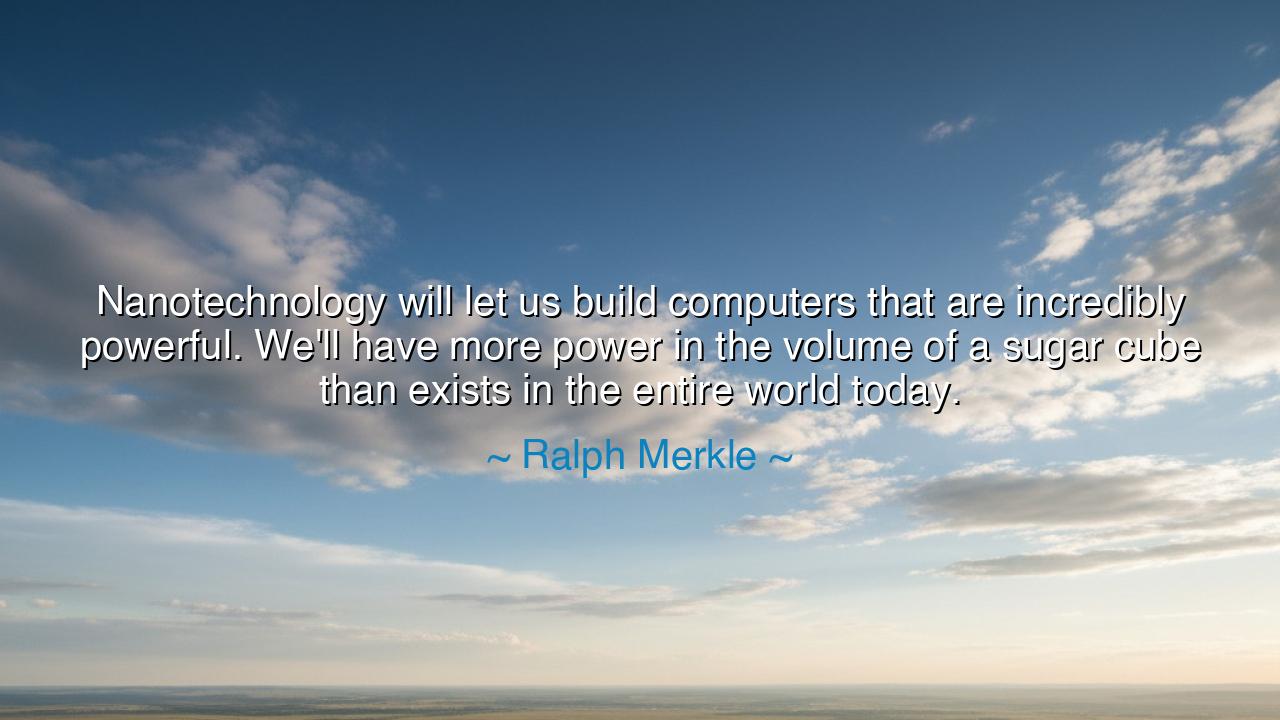
Nanotechnology will let us build computers that are incredibly
Nanotechnology will let us build computers that are incredibly powerful. We'll have more power in the volume of a sugar cube than exists in the entire world today.






In the quiet moments of reflection, when the eyes of the world are fixed on the present, the most profound changes are often unfolding just beyond the horizon. Ralph Merkle, a visionary in the realm of nanotechnology, speaks with a clarity that echoes through the ages: "Nanotechnology will let us build computers that are incredibly powerful. We'll have more power in the volume of a sugar cube than exists in the entire world today." This statement, though grounded in the future of science, carries with it a message of immense potential, akin to the fire that Prometheus brought to humankind—a fire not of flame, but of knowledge and power.
To understand the weight of Merkle's words, we must first turn our gaze to the ancient minds who dared to dream of the impossible. Archimedes, standing on the shores of ancient Syracuse, understood the power of the lever and the pulley, grasping the hidden forces of the world and applying them to change human life. In much the same way, nanotechnology promises to unlock the deepest secrets of nature, allowing us to manipulate the very building blocks of matter, atoms and molecules, to create unimaginable technologies. Just as Archimedes saw the potential to move the earth with the right lever, so too does Merkle see the potential to unleash the power of the universe from the tiniest of scales.
Imagine, then, the world of tomorrow, where the computers we use are no longer confined by the limitations of size, power, or energy consumption. A sugar cube, that humble and familiar object, becomes a vessel of unimaginable power, capable of holding the sum of all the computational might that exists in the world today. This is the promise of nanotechnology—a realm where the minutiae of the universe, those imperceptible particles, are harnessed to reshape the world. It is a promise not unlike the moment when the great explorers of the past first laid eyes on a new world, a world where all that was previously unimaginable is now within reach.
To illustrate this concept, let us look to the story of the discovery of electricity, that ancient force, once thought a mystery of the gods, now the very foundation of modern civilization. When Benjamin Franklin flew his kite in the storm, he bridged the gap between the known and the unknown, between the mundane and the extraordinary. His discovery opened the door to industrial revolutions, and yet, at the time, he could scarcely have imagined the full scope of what electricity would become. Similarly, nanotechnology is a discovery not yet fully understood, but its potential is vast, and the world is poised to open the door to a new era of power and knowledge.
The lesson in Merkle’s words is one of boundless potential. Just as the great minds of the past dared to explore the unknown, so too must we embrace the challenge of understanding and harnessing the power of the microscopic world. The technology to create computers of unimaginable power is not a mere fantasy; it is an inevitable step in the journey of human progress. In the future, it will no longer be the size of the machine that determines its capability, but the brilliance of our ability to manipulate atoms and molecules to perform complex tasks. The scale will no longer be measured in feet or inches but in nanometers, the very building blocks of life itself.
This brings us to a central truth: the future is not a passive inheritance; it is a legacy that we must create with our own hands. The advancements in nanotechnology are not some distant dream; they are already unfolding before us, slowly but surely, in labs and research centers across the globe. Just as the great Alchemists once dreamed of turning base metals into gold, so too are modern scientists working to transform the very fabric of matter itself. The power to shape the future is within our grasp, but it requires that we be bold in our pursuit, that we embrace the unknown with courage, and that we move forward with purpose.
The lesson for us, the children of the present age, is clear: we must not be daunted by the unknown or the unimaginable. We must strive to understand the forces of nature, to grasp the threads of knowledge that will one day allow us to build the unimaginable. Whether through education, innovation, or the willingness to embrace the future, we must prepare ourselves to wield the power that will one day flow through the sugar cube of tomorrow. The future belongs to those who dare to dream, who see the potential hidden in the smallest of things, and who act with vision and courage to bring those dreams to life. Nanotechnology will give us the tools, but it is up to us to create the world we wish to build.






AAdministratorAdministrator
Welcome, honored guests. Please leave a comment, we will respond soon